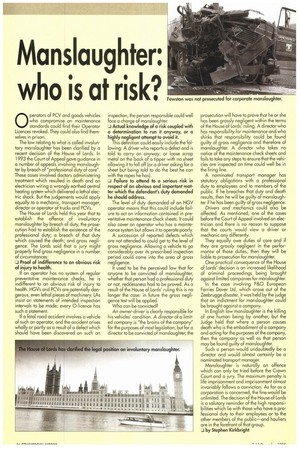Manslaughter: who is at risk?
Page 48

If you've noticed an error in this article please click here to report it so we can fix it.
Operators of PCV and goods vehicles who compromise on maintenance standards could find their Operator Licences revoked. They could also find themselves in prison. The law relating to what is called involuntary manslaughter has been clarified by a recent decision of the House of Lords. In 1993 the Court of Appeal gave guidance in a number of appeals involving manslaughter by breach of "professional duly of care". These cases involved doctors administering treatment which resulted in death and an electrician wiring a wrongly earthed central heating system which delivered a lethal electric shock. But the judgements would apply equally to a mechanic, transport manager, director or operator of trucks and PCVs.
The House of Lords held this year that to establish the offence of involuntary manslaughter by breach of duty, the prosecution had to establish the existence of the professional duty; a breach of that duty which caused the death; and gross negligence. The Lords said that a jury might properly find gross negligence in a number of circumstances: D Proof of indifference to an obvious risk of injury to health. If an operator has no system of regular preventative maintenance checks, he is indifferent to an obvious risk of injury to health. HGVs and PCVs are potentially dangerous, even lethal pieces of machinery. LAs insist on statements of intended inspection intervals to be made; every 0-licence has such a statement.
If a fatal road accident involves a vehicle of such an operator, and the accident arises wholly or partly as a result of a defect which should have been discovered on such an inspection, the person responsible could well face a charge of manslaughter. j Actual knowledge of a risk coupled with a determination to run it anyway, or a highly negligent attempt to avoid it. This definition could easily include the following: A driver who reports a defect and is told to carry on anyway; or loose scrap metal on the back of a tipper with no sheet allowing it to fall off or a driver asking for a sheet but being told to do the best he can with the ropes he has).
1,-1 Failure to attend to a serious risk in respect of an obvious and important matter which the defendant's duty demanded he should address.
The level of duty demanded of an HGV operator means that this could include failure to act on information contained in preventative maintenance check sheets. It could also cover an operator who has a maintenance system but allows it to operate poorly. A succession of reported defects which are not attended to could get to the level of gross negligence. Allowing a vehicle to go considerably over its prescribed inspection period could come into the area of gross negligence. It used to be the perceived law that for anyone to be convicted of manslaughter, whether that person had a professional duty or not, recklessness had to be proved. As a result of the House of Lords' ruling this is no longer the case: in future the gross negligence test will be applied. Who can be convicted?
An owner-driver is clearly responsible for his vehicles' condition. A director of a limited company is "the brains of the company" for the purposes of most legislation, but for a director to be convicted of manslaughter, the prosecution will have to prove that he or she has been grossly negligent within the terms of the House of Lords' ruling. A director who has responsibility for maintenance and who shirks that responsibility could be found guilty of gross negligence and therefore of manslaughter. A director who takes no notice of the maintenance check sheets and fails to take any steps to ensure that the vehicles are inspected on time could well be in the firing line. A nominated transport manager has statutory obligations with a professional duty to employees and to members of the public. If he breaches that and death results, then he will be guilty of manslaughter if he has been guilty of gross negligence. Drivers and mechanics could also be affected. As mentioned, one of the cases before the Court of Appeal involved an electrician and there is no reason to suppose that the courts would view a driver or mechanic any differently.
They equally owe duties of care and ii they are grossly negligent in the performance of those duties, then they will be liable to prosecution for manslaughter.
One practical consequence of the House of Lords' decision is an increased likelihood of criminal proceedings being brought against limited companies for manslaughter.
In the case involving P&O European Ferries Dover Ltd, which arose out of the Zeebrugge disaster, it was held by the judge that an indictment for manslaughter could be brought against a company. In English law manslaughter is the killing of one human being by another, but the Judge held that where a person causes death who is the embodiment of a company and acting for the purposes of the company, then the company as well as that person may be found guilty of manslaughter.
Such a person would undoubtedly be a director and would almost certainly be a nominated transport manager. Manslaughter is naturally an offence which can only be tried before the Crown Court and a jury. The maximum penalty is life imprisonment and imprisonment almost invariably follows a conviction. As far as a corporation is concerned, the fine would be unlimited. The decision of the House of Lords is a salutary reminder of the high responsibilities which lie with those who have a professional duty to their employees or to the other members of the public—and hauliers are in the forefront of that group. by Stephen Kirkbright












































































































